In the finish chute at 2014 Victoria Marathon, where I qualified for Boston Marathon–and where I felt I was blitzing along. Not so sure this photo captures the “blitzing” part.
I’m very precise about time: Ask me how long it takes to drive to my twins’ elementary school, and I’ll tell you 8 minutes. Not 5, not 10, but 8. (Okay, sometimes 9 if we hit too many red lights.) My alarm clock for barre class is set for 5:31 a.m. because if I get up at 5:30, I have a tad bit too much time to putter around before heading to class.
It’s not surprising, then, that I was overjoyed when my finish time at 2014 Victoria Marathon was 3:56:54. When I found out, I blurted out, “Oh, thank GOODNESS it wasn’t 3:57!” Oh, come on, we’re only talking 6 seconds.
But I knew: When it comes to qualifying for Boston Marathon, every second counts. Really and truly. As I approached the finish line in B.C. last October, I was keenly aware of this fact. I knew Dimity’s husband, like many Boston qualifiers, had been shut out of getting an entry to Boston because he hadn’t qualified with a wide-enough margin.
Here’s how I broke it down to my mother yesterday on the phone: Think of each age/gender category as a glass. Once Boston Marathon race registration opens, the glass–in my case, females age 50-54–starts to fill with women runners who qualified by 20 minutes or more. Then gals who beat the qualifying time by 10 minutes or more gain entry, then 5 minutes or more. Finally, if the glass isn’t full yet, the race organizers let in those of us who qualified by less than 5 minutes. The system isn’t first-come, first-serve, however: A runner who qualified with a 4-minute cushion gets admitted before someone who finished with 2 minutes to spare.
Past history told us runners we needed to do better than just beat our BQ time by a few seconds: To get into the 2015 Boston Marathon, qualifiers needed to be 1 minute, 2 seconds or faster for their age group and gender, while the year before, 2014 Boston Marathoners needed to be 1 minute, 38 seconds or faster for their age group and gender.
Like I said: Every second counts. Even more so for entry to the 2016 Boston Marathon: This year’s line in the proverbial sand is 2:28. Two minutes, 28 seconds. Which means I squeaked in with just 38 seconds to spare. (Which makes me repeat silently: “Thank goodness it wasn’t 3:57!”)
Another case of cutting it close on time: Within the first 10 seconds after hearing my ankle fracture, as I lay prostrate on wet bark chips at the base of the Big Red Wagon slide, I thought, “I didn’t bust my hump qualifying for Boston to not run be able to run the race.” Since that moment on May 1, my motivating mantra has been: Boston 2016. In the early stages of my healing process, when I allowed my thoughts to go dark, I thought my ankle fractures (yes, plural) wouldn’t allow me to run 26.2 miles next year. Then, by following doctor’s orders, taking care of myself, and devotedly doing physical therapy, I knew my body would most likely handle the challenge–if I could get into the race. A big if.
I learned I gained a coveted spot in a bittersweet way: a friend and fellow mother runner who qualified by 1 minute, 45 seconds texted me as I pulled into our driveway after morning carpool. I was in; she was out. My heart hurt for her. She and I had employed the same talented, compassionate coach to help us reach our respective Boston-qualifying dreams. I just happened to be in the next age bracket up, and had a slightly larger qualifying margin, but we’d both pushed to our limits and run our very best races.
While I’m very happy and proud to have made it into another Boston Marathon, it’s the idea of Boston 2016–my rallying cry during my healing process–that fuels my fire on a daily basis. The reality of Boston 2016 is going to take longer to sink in.


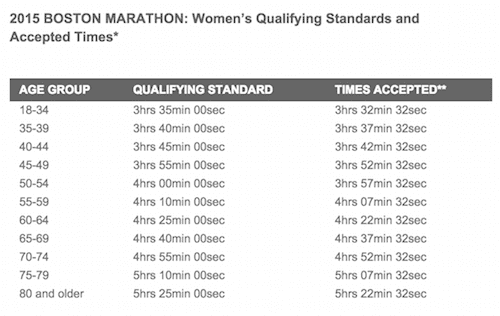

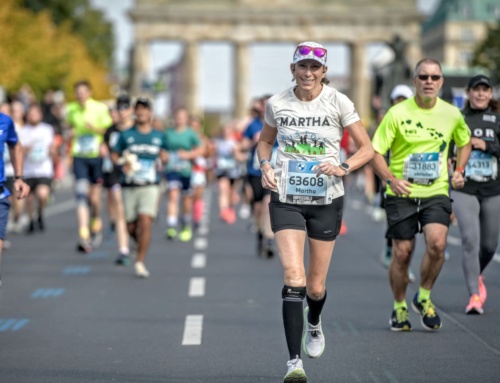
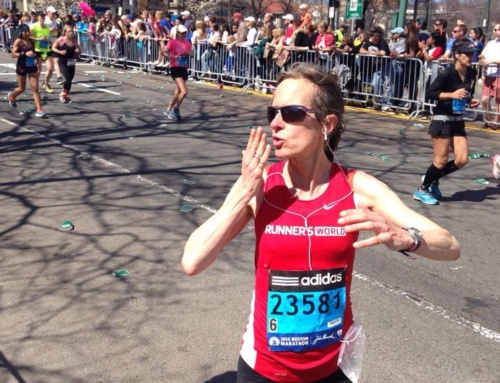
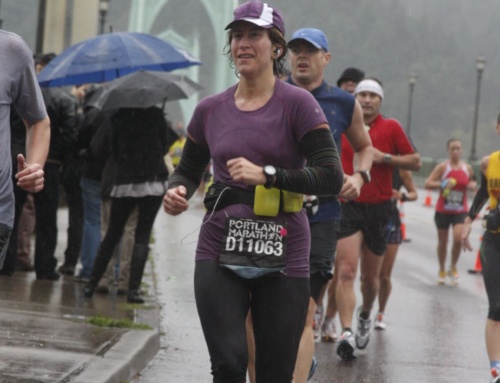
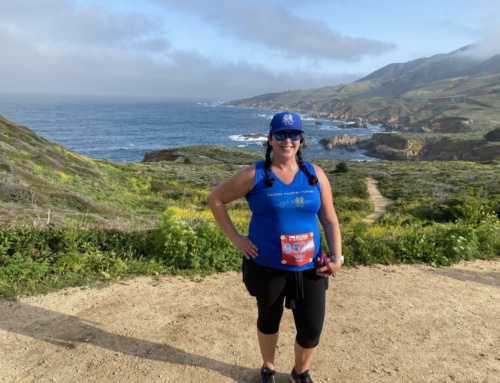
Congrats!!! I look forward to hearing about your journey.
Congrats, Sarah! I have a friend who said he wished he hadn’t stopped to pee. He was out by that little time.
Congratulations! And (as someone else in the tribe working her way back from an injury)-so impressed that you have been keeping your eye on the prize to use it as motivation to get back on your feet. Way to go Sarah!
Congrats Sarah!! I received my confirmation email yesterday, too! This will be my first Boston marathon. As quickly as I celebrated my victory, I soon was shedding a tear for my friend, who missed the cut off by 29 seconds. It’s heartbreaking, knowing how hard she worked to qualify.
Sarah, you’re in the age bracket of 50-54? ;)
Since I will never qualify for Boston, I can’t imagine putting all the work in and qualifying but not getting in, but there is the knowledge for those people that they DID qualify, when most people never will.
Congratulations!
Congrats to you….but I feel terrible for your friend who did BQ but then didn’t get in. They need to do a second Boston Marathon a week later that is just based on lottery for everyone else that doesn’t BQ and likely never will (me) who just wants to run that course.
Congratulations Sarah! I missed my BQ time by 52 seconds after a 14 minute PB – like your friend, I was elated by my time, but sad to come so close. I feel a little better this week knowing I was really three minutes off, not mere seconds. I know that I didn’t have 3:32:32 in me that day in May. I’m looking forward to 2018 when I’ll get my extra 5 minutes.
Congrats! I am really excited for you and can’t wait to follow your training.
Congrats Sarah!. So happy that your hard work paid off. You are an inspiration!
Congrats SBS!!!! You did the work to qualify, you put so much positive energy into the universe during your healing, you are going to kick a** in Boston next year! I can’t wait to follow along through your training and the race via social media and the podcast.
Super Congrats!! I’ve been wondering & watching for the update. Such good news. BAMR UP!
Congrats SBS! I am very excited for you. Hopefully Boston 2017 will be the year for me. I have another attempt planned at Houston Jan 2016.
Congrats!
Congrats SBS! I am really excited for you. You worked so hard to heal after your ankle. It shows your depth of perseverance and grit. I look forward to reading about your training and your journey to Boston 2016!
Congrats! So excited for you.
Whoot! Congrats!!
Congratulations, Sarah!!